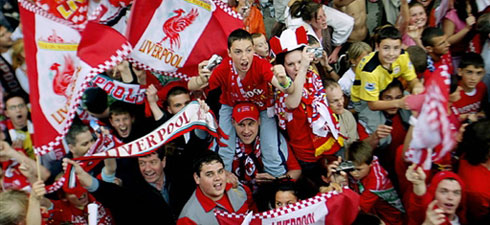With one cigarette tucked behind his ear, he rolls another in the time it takes to deliver a rapid and deftly articulated explanation in the dark-timbred voice of a 60-a-day smoker of twenty years standing. There was nothing mysterious about Ken Loach's decision to cast little known actor Steve Evets in the leading role of Looking for Eric — a film about love and passion in the lives of Manchester United supporters. To portray a Mancunian man of the people, Ken Loach simply chose a Mancunian man of the people: no cheating there. So what is unusual about the Manchester way of speaking? The answer is more complicated than you might expect. Evets is at pains to point out that he does not hail from Manchester, but from Salford on the western side of the ink-coloured river Irwell: a hardcore working class borough that is infinitely more authentic than its hoity-toity neighbour. The two cities are only separated by a five minute bus ride, but the actor is adamant that it is a completely different world — with a distinctive language that has little to do with the vernacular spoken in Manchester, Bolton, and Wigan, or the remote reaches of Leeds or Liverpool.
Steve Evets in Looking for Eric, by Ken Loach
Fortunately, the BBC has produced a radio series,Voices, to help travellers find their way in the phonetic jungle of local accents, which includes a course to "Learn Mancunian in ten minutes" as well as debates on such topics as the use of the word "mom" or "mum" in places that are separated by no more than ten kilometres. "Language is a source of pride and distinction. It is often linked to a town or a particular background: the people from the docks in Liverpool, the steel works in Sheffield, or the mills in Manchester… "Over the last ten years, my job has changed a lot," explains Kahleen Crawford, the Scottish casting director for Looking for Eric. "Accents that actors used to disguise when answering calls from producers in London have now become their most precious assets." As an ear training exercise, David Peace, one of the leading lights of a new generation of British novelists and the author of exceedingly dark Red Riding Quartet, advises us to take the bus ride between Huddersfield and Leeds — which was a major feature of his childhood — "to listen to the changing expressions and tones of voice that vary from one stop to the next."
From Morrissey to Liverpool supporters
But times have changed since Peace was a teenager, and the journey from Huddersfield to Leeds, which used to be an expedition into the labyrinth of poplar speech, now travels through modern neighbourhoods where luxury shops have opened in the old market halls. Talk is marked by foreign intonations from Asia and Eastern Europe, and not everyone is speaking English. But the local speech still endures. Recently, the citizens of Leeds rebelled against an announcement on the Number 28 bus, which had been recorded in a voice that was too plummy for the local taste. "Now that Scotland and Wales have their own parliaments," says the writer, "Northerners are taking more pride in their backgrounds, and particularly in local voices. It's a trend that groups like Oasis have milked to the point of absurdity. Celebration of local speech should be creative, but in some cases it is indicative of a siege mentality. It's hard to know where we are going, but there certainly has been a shake-up."
It is not often that Northern identity is conveyed in writing: "It's anti-intellectual," says David Peace,"a physical and visceral culture," which is expressed in various forms: in cinema, popular music, television, on the street, and on the terraces etc. And today, northern voices have assumed a new prevalence in places where they were never heard before. In the late 1950s, before the emergence of the Beatles and the insolent mockery of Liverpudlian youth culture, singers from the North struggled to rid themselves of their phonetic heritage. "To become a teacher, my father had to attend elocution classes in London," explains David Peace. "That was in 1957, when the only socially acceptable form of English was the idiom of the upper classes — the polite speech of the BBC, which we now call received pronunciation."
Liverpool supporters at a match against Arsenal, 1964.
But that all changed with the 1960s, when the cultural influence of rock music, cinema and football made Liverpool a rising star. "It was like living in a waking dream," says academic and broadcaster Rogan Taylor, who has spent a lifetime in the Kop [the term affectionately used to refer to Liverpool FC's Anfield stadium]. The Reds manager, Bill Shankly, promised us the moon, the terraces were awash with Beatlemania, and the crowd serenaded the players with “We love you yeah, yeah, yeah!” or “We all live in a red and white Kop” [ to the tune ofYellow Submarine]. And that was only the beginning. In the decades that followed, the supporters of Liverpool — along with Morrissey, the Beatles and the characters of Ken Loach — revealed the truly human significance of joy and disappointment in a small industrial region, and in so doing, became icons of a universal romanticism that extends far beyond the confines of Northern England to inspire people all over the world. In the words of the famous Anfield anthem: "You’ll never walk alone."
Was this article useful? If so we are delighted!
It is freely available because we believe that the right to free and independent information is essential for democracy. But this right is not guaranteed forever, and independence comes at a cost. We need your support in order to continue publishing independent, multilingual news for all Europeans.
Discover our subscription offers and their exclusive benefits and become a member of our community now!












